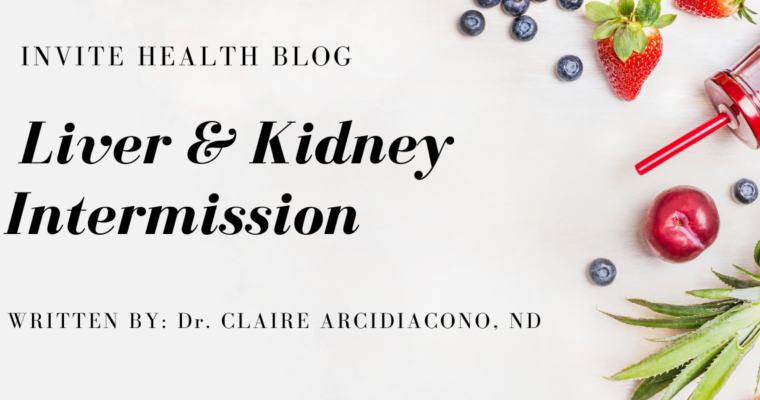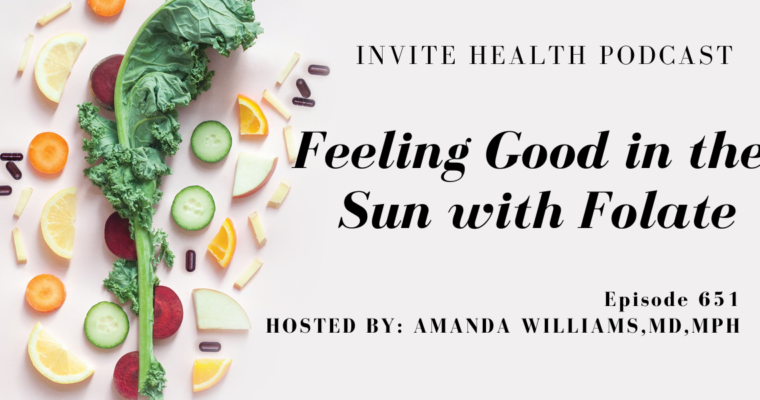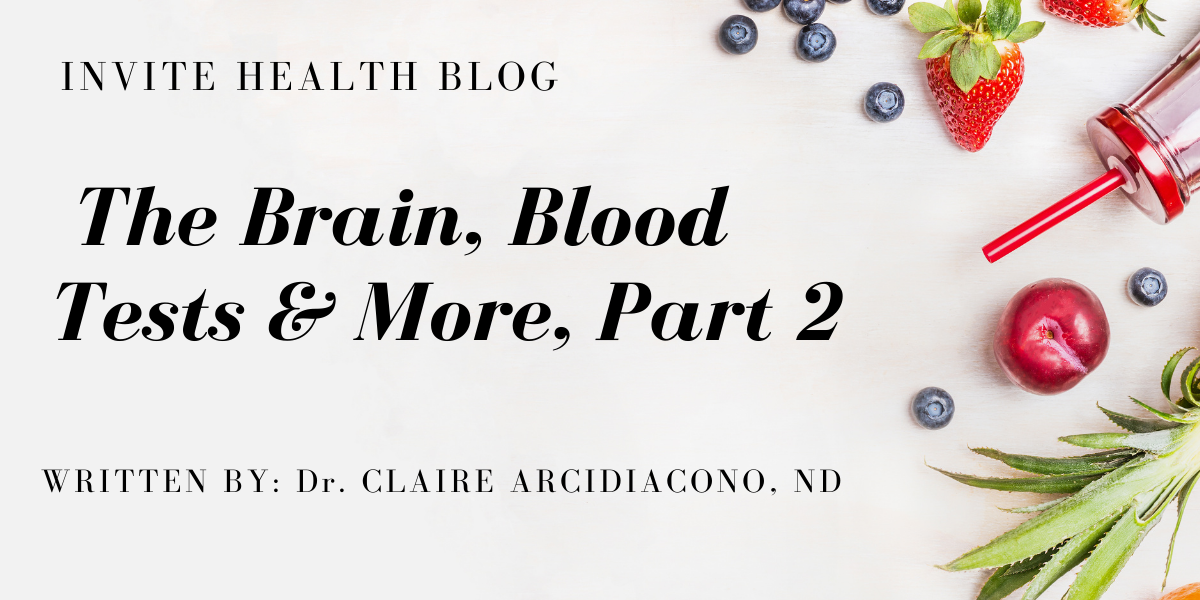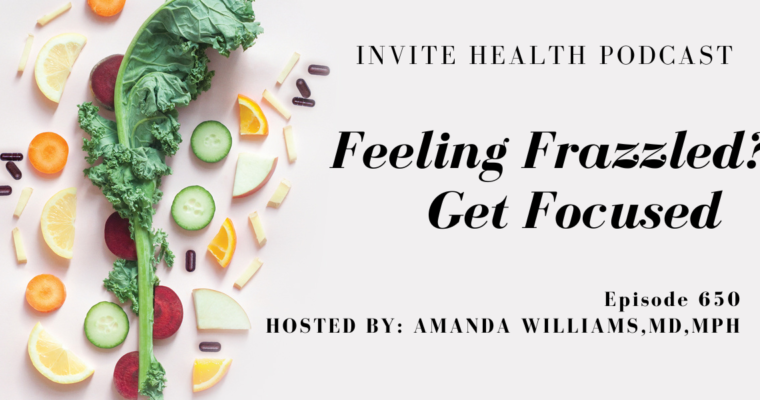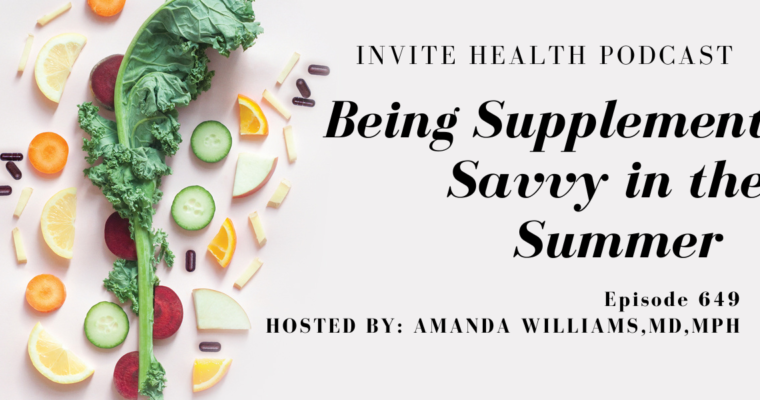Subscribe Today!
Please see below for a complete transcript of this episode.
DAILY FOCUS & MEMORY SUPPORT JUST GOT EASIER, INVITE HEALTH PODCAST, EPISODE 648
Hosted by Amanda Williams, MD, MPH.

*Intro Music*
InViteⓇ Health Podcast Intro: [00:00:04] Welcome to the InViteⓇ Health Podcast, where our degreed health care professionals are excited to offer you the most important health and wellness information you need to make informed choices about your health. You can learn more about the products discussed in each of these episodes and all that Invite Health has to offer, at www.invitehealth.com/podcast. First time customers can use promo code podcast at checkout for an additional 15% off your first purchase. Let’s get started. † [00:00:34]
*Intro Music*
Amanda Williams MD, MPH: [00:00:40] We’ve all probably had those times where you say, gosh, I feel super scatterbrained today, or I just can’t seem to focus. My memory is not that great today. And we know that there are many factors that can lead to this. We can look at just the aging process alone. We can look at how underlying disease states can affect our cognition. This is usually one of the biggest concerns that many individuals have as they grow older is to maintain their memory and their attention, their focus, their ability to connect with others, having conversations. We know that there are many things that we can be doing as far as lifestyle modifications to include healthy foods, adherence to a Mediterranean style way of eating, incorporating in the right nutrients, including omega three fatty acids to maintain that brain volume. And there are other things that we know through scientific research that can be so beneficial for the health of your brain to improve upon your overall cognition, including focus and attention. I am Dr. Amanda Williams, scientific director at Invite Health and I want to discuss our Memory Multivitamin. This is an excellent choice for anyone who has those daily concerns of high stress feeling, lack of focus. Maybe you feel like you’re not as sharp as you used to be. This is your go to daily multivitamin. It comes in an individual packet. It is our core multivitamin. So, it’s giving you all of those powerful vitamins and minerals and key antioxidants to help fight off all of the free radicals that can be detrimental to our brain’s daily function. It includes the activated B vitamins, which help to enhance the way that your neurotransmitters are released to help us regulate our anxiety, our stress help us feel good with that release of serotonin. It has all of the key minerals that the body requires for proper functioning to regulate inflammation. They are high absorption minerals, they are highlighted, which is wonderful. But what really sets this particular multivitamin apart from any other multivitamin is that it contains three key nutrients that zero in have been shown to be clinically effective and safe when it comes to your memory, focus and attention, and that is lithium, ginkgo biloba and CDP choline. † [00:03:13]
[00:03:14] So let’s talk about the science of these different nutrients. We know that when it comes to mild cognitive impairment, memory loss, attention deficit, you know, a lot of folks feel like they can’t focus. And we know that diet plays a major role into this. But we also have to look at the key reasons as to why that is. Why are we losing that connection for the brain cells to be able to effectively communicate with one another? Why are we having issues when it comes to the way that the neurotransmitters are being released? Well, we can certainly look at the influence, the outside influence, the extrinsic factors that can impact our day-to-day brain function as being one driver. We can look at the inadequate intake of healthy brain foods, including things like berries and healthy fats, which we know are very, very good for our brain. So, we have to look and say, well, the brain needs energy, the brain needs proper blood flow and oxygenation, and the brain needs a mechanism to be able to communicate effectively between brain cells so that we can do and perform each and every single day. So, this is what this combination, this trio of ginkgo biloba, CDP, choline and the lithium are going to provide for you. So, let’s first start with lithium, because this is the one that I think most people will have a question about. What is lithium? What exactly is it doing? Well, what we know about lithium is this is a trace mineral. And we recognize that lithium can actually prevent cognitive decline. Mine in clinical studies have actually indicated how it helps to activate different pathways that can actually slow the aging process that’s occurring within the brain. We know that lithium is this naturally occurring mineral, and there have been studies that have even indicated that areas in the world have higher lithium in the drinking water, that those individuals actually have longer lifespans than areas that are more deficient in lithium. The way in which lithium is actually working is through its benefit to be able to inhibit an enzyme known as glycogen synthase kinase three. So, glycogen synthase kinase three also goes by the name GSK three. This controls many different important functions within the cell. But we know that when GSK three is overactive, if it’s working too much, this can be incredibly harmful for our brain, and that can actually accelerate the aging process when we get loss of function. We know that overactivity of GSK three is linked to many different chronic disease states, including type two diabetes, different mood disorders, and, of course, Alzheimer’s disease. What we recognize is that low dose lithium can actually inhibit or reduce the activity of this overactive GSK three enzyme, which is very important when it comes to your focus and to your memory. This is a wonderful thing. † [00:06:39]
BRAIN HEALTH & MEMORY, PART 2: BRAIN ANATOMY>>READ NOW!
[00:06:39] We can now look at lithium as being an anti-aging mineral that helps to optimize our brain function. Of course, it’s also very beneficial when it comes to bone health as well. So, you know, I always like to talk about side benefits of nutrients. So, when you’re taking the Memory Multivitamin, not only is this going to be very beneficial for the health of your brain, it’s also incredibly supportive for cardiac function as well as for bone health. And we’ve seen studies that have indicated that this low dose lithium is very protective to the health of your kidneys. So, in the setting of diabetes, where we know that there’s diabetic related dementia, there is loss of function within the renal system where your kidneys aren’t functioning as well. There are the cardiac stressors that go along with diabetes. So having the low dose lithium that’s contained in the memory multivitamin can certainly be incredibly beneficial. We can see how its use initially was in the setting of psychiatric care and is still prescribed at much higher doses for folks who suffer from conditions such as bipolar disorder. But through its use in psychiatric care, we can see all of its multiple system benefits, such as the protection of bones, the protection of kidneys. So when you’re taking a daily multivitamin that contains this wonderful low dose lithium, we can now start to fast track and say, oh, wow, I’m going to be not only helping with the neuronal connections, extending the life span of my brain cells, helping to support my mood, but at the same time, I’m getting this additional support when it comes to bone health and the Journal of Osteoporosis International, they actually talked about this, the use of lithium and the reduced risk of a fracture. So, this was a meta-analysis. So, they populated multiple clinical studies and they looked at how lithium use was incredibly supportive to maintaining healthy bone density as we get older. So that’s one of the wonderful side benefits that goes along with the lithium. And we can see through the many years of research on lithium when it comes to psychiatric treatments, you could start to see its many benefits when it comes to how it protects the brain. So, the neuroprotective aspects of lithium, the way in which the lithium is actually working, is to reduce the buildup of beta amyloid so that misfolded protein that accumulates in the brain and causes disruption. This is the hallmark, one of the key indications for Alzheimer’s disease. So, understanding that the memory multivitamin contains this low dose lithium to yield us all of these wonderful effects that helps the brain cells better communicate, helps us stay more focused, help support a healthy mood as we grow older, and at the end of the day is a overall neural protectant. † [00:09:51]
[00:09:52] Now, we also combine this with ginkgo biloba. Ginkgo biloba is one of the most widely, outside of all of the different herbal extracts that you can get your hands on. And this is a wonderful addition to this daily multivitamin, because we can recognize that ginkgo biloba helps to facilitate proper cerebral blood flow. So, it helps to enhance and protect the vessels that run into the brain, keep them protected from oxidative stress, those daily stressors that can impact our focus and our attention. We can see through functional MRIs how impactful ginkgo biloba supplementation can be in helping to highlight up, help to activate parts of the brain that help us with memory, help us with cognition, performing daily tasks. And of course, it helps with the oxygenation into the brain as well. In the evidence based complementary and alternative medicine journal, they talk about this. They talk about how ginkgo biloba has all of these multiple benefits for cardiovascular function. Working as a very powerful antioxidant, certainly has the ability to help limit inflammation. It’s enhancing that nitric oxide production, so, we’re getting that optimal blood flow. But unlike other, you know, medications, let’s say, that are out there, this is working to also help to repair damaged vessels. And this is key. We have to maintain that vascular integrity, especially when we think about our brain’s blood supply. So, through functional MRI, they can see how areas of the brain, when exposed to ginkgo biloba, really help to enhance those neuronal connections once again. So now we’ve got two things that are helping with those cell-to-cell communication pathways. Wonderful, right? This is always what we’re looking at. We know there’s anti-aging effects that go with lithium. We can see all of the many different ways that ginkgo biloba has been studied to help us with working memory. Also, in the Journal of evidence based Complementary and Alternative Medicine, they talked about this. They looked at brain cognition in the effects of ginkgo biloba, how it helps with the activation within the brain and different parts of the brain, the temporal lobe, the hippocampus, the cortex, and allows us to be more sharp, be more focused, have better attention, which is a wonderful thing. And then we add in the CDP choline this very important phospholipid, the CDP Choline helps the brain manufacture acetylcholine, which is our primary neurotransmitter, very important when it comes to memory and daily function of performing tasks. Choline is that precursor. So having this very important membrane fat helps to not only protect the brain cell in terms of its structures, we don’t want to have dings and dents in our brain cells. So, we have this CDP choline that has been shown in multiple clinical trials to have this very powerful effect. In many parts of the world, CDP Choline is actually prescribed as a treatment for dementia, mild cognitive impairment as well as Alzheimer’s disease. So, we want to be able to support healthy cognition and attention. We want to support our overall memory, our mood. And we know that this trio of nutrients, the ginkgo biloba, the low dose lithium and that CDP Choline, can allow us to achieve better brain performance each and every single day. So, this is our brand-new Memory Multivitamin, very easy to use. † [00:13:57]
ICYMI:KEEPING THE BRAIN CLEAN WITH RESVERATROL, INVITE HEALTH PODCAST, EPISODE 645>>LISTEN NOW!
[00:13:58] Remember, we’re covering those gaps that perhaps our diet is not giving us when it comes to adequate exposure to those key vitamins and minerals powering up the brain with all of those nutrients, helping our immune system, giving us those antioxidants to fight off free radicals. Definitely encourage you to check this one out for sure. You are concerned with your aging brain. The Memory Multivitamin is going to be your go-to. So, I want to thank you so much for tuning in to the InViteⓇ Health Podcast. Remember, you can find all of our episodes for free wherever you listen to podcasts or by visiting invitehealth.com/podcast. Do make sure that you subscribe, you leave us a review. You can follow us on Facebook, Twitter, and Instagram and we will see you next time for another episode of the InViteⓇ Health Podcast.† [00:13:58]
*Exit Music*


